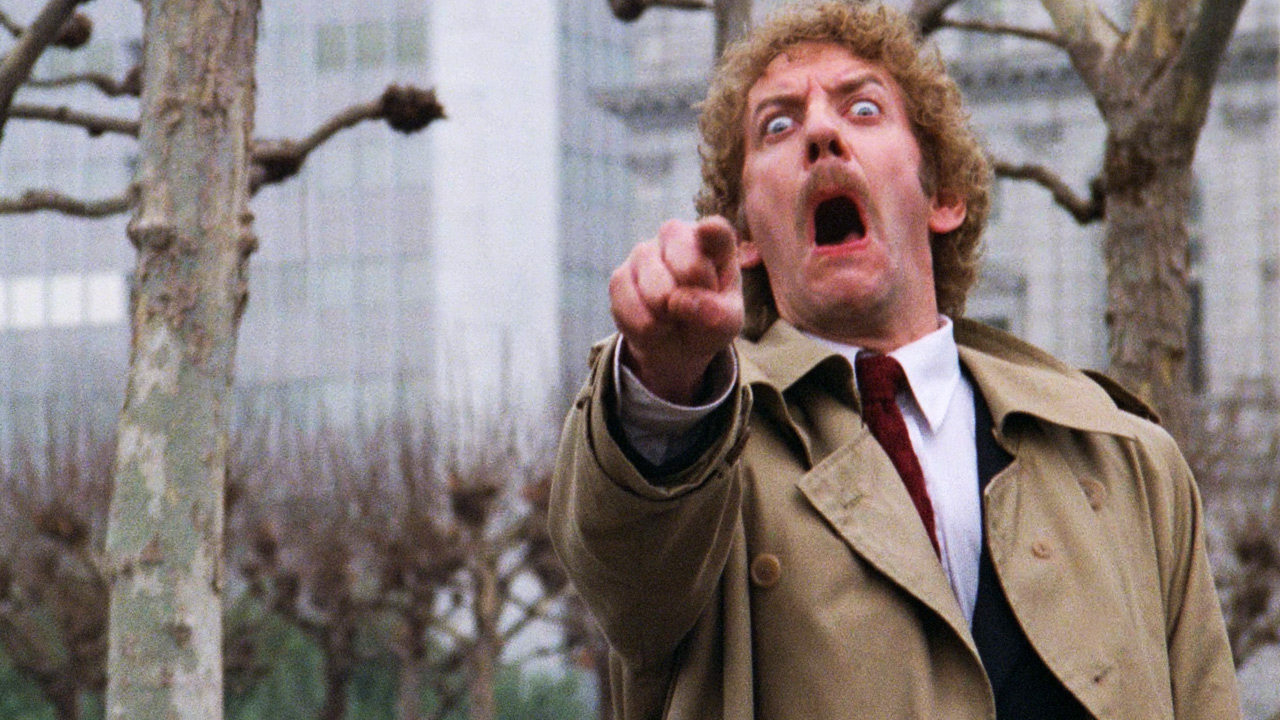Body snatchers and freaky screams: revisiting Donald Sutherland’s most iconic role

Remembering the late, great Donald Sutherland, Luke Buckmaster revisits the contagious terror of sci-fi remake Invasion of the Body Snatchers: the actor will forever be tied to its unforgettable, stomach-dropping finale.
Is that person on the bus, or at the dinner table, or in the conference room, looking a bit absentminded…or have they been possessed by an alien? That rather dramatic question, juxtaposing the completely commonplace with the unthinkably strange, is brilliantly tossed around in director Philip Kaufman’s sci-fi classic Invasion of the Body Snatchers, starring the late and great Donald Sutherland in one of his best-known roles.
Sutherland, whose recent death inspired me to revisit the film, had an incredible serpentine glare: an ancient otherworldly sparkle that made him a great villain, perhaps most famously as President Snow in The Hunger Games, and added entrancing qualities to his many portrayals of haunted or grief-stricken souls. There was something darkly intangible about his presence…almost as if some unusual life form had burrowed inside him.
In Body Snatchers, Sutherland’s flawless portrayal of a doomed hero contains something that tends to elude even the most famous performances: an individual image seared onto the zeitgeist, brandished like a hot iron onto our collective psyche. Even if you haven’t seen the film you’ll most likely recognise this memeable, gifable, fridge magnet-able moment, captured in the final shots (spoiler alert) and delivering a devastating gut-punch just before the closing credits roll.
Sutherland raises his hand and points towards a person approaching him while his face contorts into an Edvard Munch-esque scream, lips stretching towards the heavens, eyes wide and terrorised. As this happens we hear a blood-curdling scream not born of this world. This scene always gives me the collywobbles, revealing that Sutherland’s character Matthew Bennell, a public health official, has transformed into an alien or “pod person,” his body indeed snatched by an alien species that survives by mimicking then replacing other life forms.
There’s a myriad of ways you can interpret this moment’s metaphorical meaning. Kaufman himself demonstrated its evergreen pliability to The Hollywood Reporter in 2018 when he called it “as valid now as it was then, maybe more so,” comparing Sutherland’s pod shriek to “a very Trumpian scream.” And adding: “The way Trump points to the press in the back of the auditorium and everybody turns, you get that scary ‘poddy’ feeling. There’s a kind of contagion that’s going on here.”
Bennell begins the film by finding rat excrement in the kitchen of a fancy French restaurant, establishing the protagonist as both an authority figure and a man of the people. Early in the runtime—Kaufman doesn’t dilly-daddle—people start to act strangely, including the boyfriend of Bennell’s colleague, Brooke Adams’ lab scientist Elizabeth, who explains that “Geoffrey is not Geoffrey…on the inside I can tell that there’s something different, something missing.”
Soon later a local dry cleaner makes a similar comment to Matthew: “that’s not my wife.” More and more people join the chorus; before you know it somebody’s screaming “they’re one of them!” Leonard Nimoy has a small role as Dr. David Kibner, a skeptic who suggests society is experiencing some kind of “hallucinatory flu.”
The film’s terribly intense atmosphere—it’s sticky and feverish, like a shocking rash—shows that even the silliest concepts can feel nightmarishly real in the right hands. It belongs to a pantheon of paranoid 70s thrillers, typically defined by conspiratorial narratives and a festering feeling that there’s nobody to turn to, including and especially authorities—the most famous including The Conversation, Marathon Man, Soylent Green and The Parallax View.
Invasion of the Body Snatchers fits this canon like a glove, although its roots come from an earlier era, being adapted from a 1955 novel that spawned a bunch of other movie versions, one released just a year after it was published, helmed by Dirty Harry director Don Siegel (there was also 1993’s Body Snatchers, with Gabrielle Anwar and Forest Whitaker, and 2007’s The Invasion, with Nicole Kidman and Daniel Craig). Like Kaufman’s film, the ’55 version takes a wild path into the old question of what it means to be human, getting a little on the nose when Kevin McCarthy’s protagonist declares that it’s “only when we have to fight to stay human do we realise how precious it is.”
Kaufman’s vision is bleaker and meaner, perhaps also a little sardonic. A splash of bitter humour helps explain one devilish touch: when the director deploys organ music playing—of all songs—Amazing Grace while we see alien pods being loaded onto a cargo ship. It’s a wild, goose-fleshing raising moment, although—with that final shot yet to arrive—there’s more where that came from.

















